GUN TESTS GRADE: A-
$599
In the July 2020 issue of Gun Tests, we evaluated a Savage Arms 110 bolt-action Hog Hunter rifle chambered for the new 350 Winchester Legend cartridge. But the Hog Hunter that originally caught our eye was chambered for 223 Remington, a round we are much more familiar with. The Hog Hunter formula consists of a medium-contour barreled action fed from a removable box magazine, and the barrel is free-floated in a synthetic stock. The 22-inch-long threaded barrel was suppressor ready, and iron sights were supplied. Also, the rifle carried an oversized bolt handle, adjustable AccuTrigger, and a healthy rubber buttpad. The gun was muzzle heavy but still much lighter and more maneuverable than the precision rifles that are popping up from every conceivable manufacturer. Add to this an MSRP of $599, and our imagination ran wild with the possibility of turning a 223 Remington M110 Hog Hunter 57018 into a budget handy rifle we could easily tote or mount inside a jeep or light truck.
| Action Type | Bolt, right hand |
| Overall Length | 39 to 40.125 in. |
| Overall Height w/o Scope Mount | 5.8 in. |
| Weight | 7.3 lbs. |
| Barrel | 20.0 in. long, matte black carbon steel, 1:9 twist, medium contour |
| Receiver | Matte black carbon steel |
| Receiver Scope-Base Pattern | Savage Model 10 short action |
| Capacity | 5+1 (factory), 10+ or 15+1 aftermarket |
| Magazine | Detachable box |
| Stock | Matte dark green synthetic sporter, rubber recoil pad, sling swivel studs |
| Stock Length of Pull | 13.75 in., adj. |
| Stock Drop at Comb | 0.5 in. |
| Stock Drop at Heel | 0.62 in. |
| Stock Bedding | None |
| Trigger | 2.7 lbs , adj. AccuTrigger |
| Sights | Adj. iron |
| Sight Radius | 12.75 in. |
| Safety | 3-position tang |
| Warranty | 1 year for original owner |
| Telephone | (800) 370-0708 |
| Website | SavageArms.com |
| Made In | USA, Massachusetts |
Our only hesitation to go out and buy a 223 Hog Hunter was based on the relatively low five-round capacity of the magazine. A call to Savage headquarters in Westfield, Massachusetts revealed that additional-capacity magazines were not available from the maker, but then the rep all but whispered there might be some to be found after market. A quick Internet search brought up SnyderMags.com. Tom Snyder produces 10- and 15-round magazines exclusively for Savage rifles. With plenty of hand-loaded 223 Rem. on hand (made before the pandemic), we had the desire for the highest-possible capacity. So we placed an order for two $95 each 15-round 223 magazines even before receiving the rifle. In addition, we ordered a Surefire Warcomp (combination flash hider, muzzle brake, and suppressor adaptor), $129 from MidwayUSA.com. For offhand support, we planned to adapt an $89 Galco Safari Ching Sling, using $29 GrovTec Push Button Base-to-Stud adaptors for QD sling loops. Our initial plan was to zero the iron sights and then apply a scope, utilizing quick-release rings and leaving the sights in place for backup.
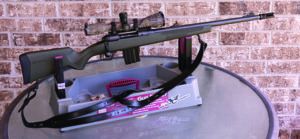
The supplied sights consisted of a gold-bead front post and ramp-style rear sight. The rear-sight notch was adjustable for windage as well as elevation with setscrews to affix the notch left or right as needed. The proper sight picture upon mounting the rifle was to see the front bead resting at the bottom of the notch. The desired point of impact should rest directly on top of the bead captured within the sides of the notch. The right-hand side of the rear-sight base was calibrated 0-600 yards, but as we learned from a trip to the range, the markings were simply for reference and not actually indicative of distance.
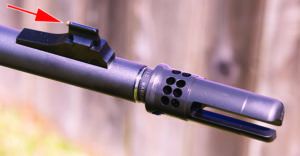
Somewhat disappointed, we learned to adapt via choice of ammunition. Fast-moving 55-grain bullets proved closest to our point of aim at 50 yards. Given the barrel offered a twist rate of 1:9 inches, this was to be expected, but given the generous chamber size, we were able to shoot 77-grain ammunition quite accurately, if not a couple of inches high. Three-shot groups at 50 yards with Black Hills’ 77-grain hollowpoint 223 rounds averaged just less than 0.60 inch with iron sights. Nevertheless, we thought adding a scope would be highly beneficial for greater distance accuracy, so we ordered a zero-minute-of-angle Round Back Picatinny rail from Evolution Gun Works, $39 at EGWguns.com. The EGW scope mount was the lightest rail providing the lowest mount height we could find. There was also a channel running through its centerline that afforded additional clearance should we need it to accommodate the contour of a larger objective lens.
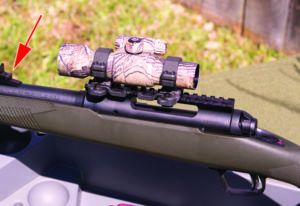
For shooting hogs or any type of moving targets within 100 yards, a reflex sight is hard to beat. Our choice was an Aimpoint 9000SC 30mm red-dot scope ($462, MidwayUSA.com). As reliable as they come, we hedged our bets by applying a $130 set of Number 30 Throw Lever quick-release low-mount rings by Atlantic Research Marketing Systems (A.R.M.S.) so we could quickly access the open sights in case of failure. A.R.M.S. (ARMSmounts.com) is one of the oldest and most respected suppliers to the United States military, with more than 100 patents. Our second choice for optics was a classic bargain target scope, the Bushnell Elite Tac Optics 10x40mm Bushnell Mil-Dot scope, $393, currently available from PrecisionOptics.net. We added a set of $20 Butler Creek scope caps to keep the lenses clean. We finished the project by wrapping the Bushnell scope with McNett self-adhesive cloth camouflage wrap, $13 from MidwayUSA.com.
The Hog Hunter arrived with no less than four spacers to adjust length of pull. We chose to use none of them, resulting in a 12.5-inch length of pull and a fast-handling 38.5-inch overall length (sans the Warcomp). Holding the rifle with thumbs directly below the release points of the lens caps, the shooter was able to expose the sight picture as the rifle was raised into firing position.
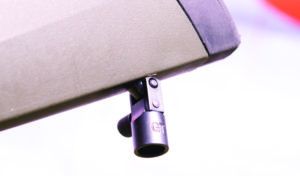
Application of the Warcomp combination flash hider, muzzle brake and suppressor mount began with experimenting with the right combination of supplied shims so that the porting faced upward once the unit was fully seated. The ports were divided into groups of six on each side. The manufacturer recommends centering the ports if shooting from support is your primary method. For off-hand shooting, the preference is to cant the ports toward the shooter’s strong side, so that the rifle is directed toward the center of the body on recoil. Supplied shims measured 0.001 inches, 0.005 inches, and 0.20 inches thick. The supplied wrench cinched down the Warcomp by threading into its three-prong flash hider.
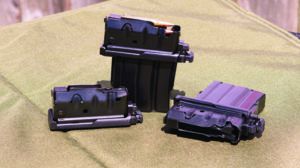
The Galco Safari Ching Sling was constructed of dark Havana Brown leather and designed for rapid support. Taking advantage of the QD adapter from GrovTec.com, we could go from bench-rest shooting to offhand with sling support and carry in seconds. The forward section of the sling consisted of two strands with an elbow loop in the center. Once adjusted to the proper position, the loop was ready to support the shooter’s elbow. Our favorite technique was to push the support hand through the strands of the forward portion of the sling and grasp the stock with the sling wrapped around the forearm. With the elbow in the support loop, the shooter is able to take full command of the rifle, freeing the strong hand to work the oversized bolt or complete a reload.
Best accuracy from the 100-yard line at American Shooting Centers in Houston was achieved using the Bushnell 10-power scope. Handloads topped with 55-grain Sierra HPBT and Sierra 60-grain TMK bullets produced five-shot groups averaging 0.8 and 0.9 inches, respectively. The Black Hills 77-grain hollow points were slightly better, printing five-shot groups fractionally less than 0.8 inches, on average.
Our Team Said: We think the best all-round choice of optics for the Hog Hunter would be a variable-power optic starting at 1x power, seated in a quick-release mount for fast access to the backup iron sights. But if any one aspect sold us on the Hog Hunter, it was the availability of high-capacity magazines from SnyderMags.com. Our rifle utilized the magazines with the latch mounted to the magazine itself. Operation of the magazine catch and the cycling of rounds from the Snyder magazines were as flawless as the Savage factory magazine. The result was a stylish, high-capacity light-to-medium-weight fast-handling bolt-action rifle we could pack just about anywhere.


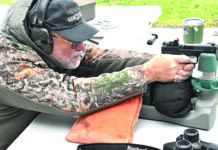
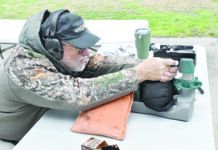
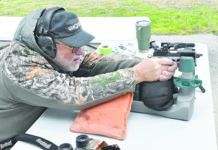
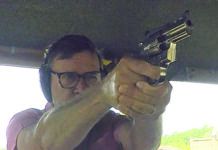
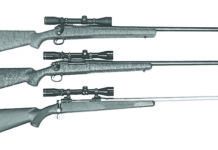
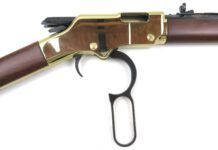
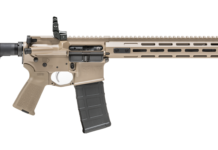
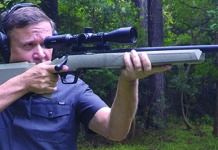





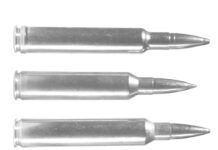
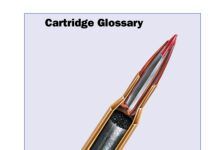
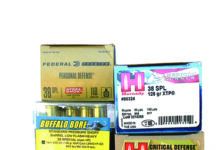
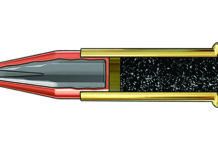
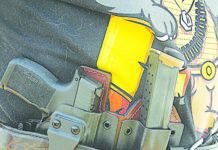






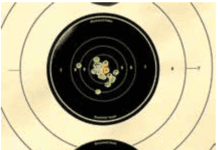
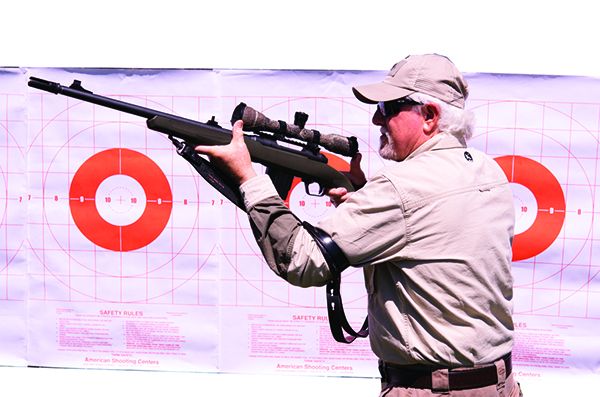

I noted that this was a low cost truck gun. All the additions, including taxes of 8.25% and shipping and handling est. at average of $9 each, cones out to $1,876.12! Wow! A cost savings of a couple of hundred dollars could be saved with a cheaper red dot. But still to me that’s a lot of money for a truck gun!